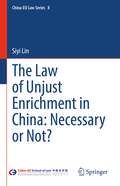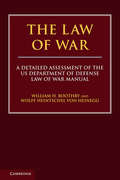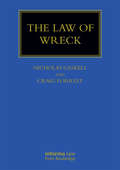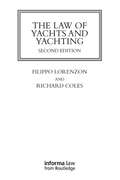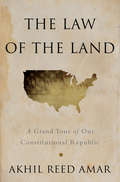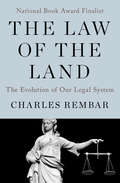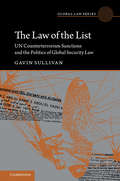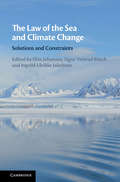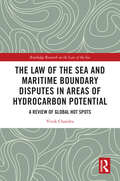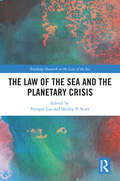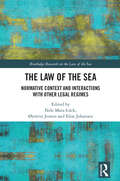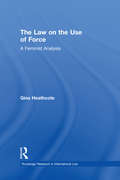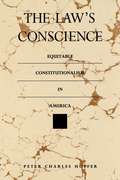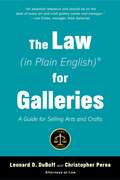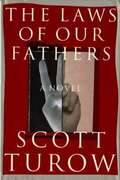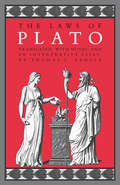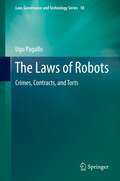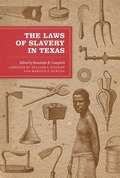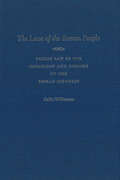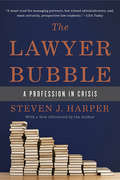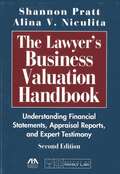- Table View
- List View
The Law of Unjust Enrichment in China: Necessary or Not? (China-EU Law Series #8)
by Siyi LinThis book is the first book focusing on the Chinese law of unjust enrichment in English and introducing it to Western jurisdictions. Unjust enrichment is currently one of the most controversial areas of law in many jurisdictions and rife with academic debate. This book analyzes the historical evolution, current doctrines, and relationships of unjust enrichment with other areas of private law in China. It also provides insights into judicial practice. In May 2020, China promulgated its first-ever Civil Code since the establishment of the People's Republic of China, which is a milestone in the history of Chinese law. Before the Civil Code, there was only one legal provision regulating unjust enrichment, which requires a person obtaining benefits “without a legal basis” to return such benefits. However, the new Civil Code contains a separate chapter regulating unjust enrichment. This book analyzes and evaluates those new provisions in the Civil Code to provide a most up-to-date analysis of the Chinese law of unjust enrichment.
The Law of War: A Detailed Assessment of the US Department of Defense Law of War Manual
by William H. Boothby Von Heinegg Wolff HeintschelIn 2015, the United States Department of Defense published its long-awaited Law of War Manual making a significant statement on the position of the US government on important military matters. Whilst readers recognise the Manual's legal and strategic importance, they may question whether particular statements of law are legally accurate or complete. This book offers a unique in-depth review of the complete Manual, including revisions, on a paragraph-by-paragraph, line-by-line and word-by-word basis. The authors offer their personal assessment of the DoD's declared view as to the law that regulates the conduct of warfare, a subject of unparalleled current importance. William H. Boothby and Wolff Heintschel von Heinegg offer a balanced, articulate and authoritative critique for readers perusing the Manual in whatever capacity.
The Law of Wreck: Effective Legal Governance Of Wwi Wrecks (Maritime and Transport Law Library)
by Nicholas Gaskell Craig ForrestThis book covers wreck law as an integrated whole, going beyond the question of "removal" to include issues such as the ownership of wreck and how the law deals with the many commercial law problems arising after ships have been wrecked during the maritime commercial adventure. The book offers authoritative guidance on the genesis and meaning of the Nairobi Wreck Removal Convention 2007, and the interpretation of its often-complex provisions as they apply both to States trying to use its powers and to shipowners and liability insurers faced by its obligations. The authors explain the increasingly complex inter-relationship between linked areas of maritime law, including salvage, intervention and the overlapping international regimes which deal with pollution from oil, bunkers or hazardous and noxious substances. The book examines how a salvage operation transitions to wreck removal and links the liability provisions with the standard form international commercial contracts actually used by the industry to remove wrecks, eg BIMCO’s Wreckstage 2010, Wreckhire 2010 and Wreckfixed 2010. It also covers the complex requirements concerning the disposal of wrecks, including the latest recycling regulations applicable in 2019. The Law of Wreck will be of value to shipping industry professionals, insurers and legal practitioners, as well as academics and students of maritime law.
The Law of Yachts & Yachting (Maritime and Transport Law Library)
by Richard Coles Filippo LorenzonNow it its second edition, The Law of Yachts and Yachting is a comprehensive treatise on the law relating to yachts and provides its readers with a thorough analysis of maritime law as relevant to the superyacht sector. Written by a team of leading yachting practitioners and researchers, it covers the legal issues arising during the life of a yacht. The book is written for the legal practitioner, yacht-broker and manager concerned with the operation of professionally crewed yachts including financing, registration, chartering, insurance, compliance and casualty management. Key Features - •The only practitioners’ book on the area •It covers all major aspects of yachting law in a single book •The Law of Yachts and Yachting is highly comprehensive - despite its main focus on contract and tort law, it contains references to public law and international law and practice •References to case law, English, foreign and international •Appendices containing essential source materials The second edition will cover important changes in the superyacht industry such as: the new MYBA Charter Form 2017, the Large Yacht Code (LY3) and the Passenger Yacht Code, both shortly to be consolidated into the new REG-YC, and the coming into force of the Maritime Labour Convention 2006, to name just a few.
The Law of the Land: A Grand Tour of Our Constitutional Republic
by Akhil Reed AmarFrom Kennebunkport to Kauai, from the Rio Grande to the Northern Rockies, ours is a vast republic. While we may be united under one Constitution, separate and distinct states remain, each with its own constitution and culture. Geographic idiosyncrasies add more than just local character. Regional understandings of law and justice have shaped and reshaped our nation throughout history. America’s Constitution, our founding and unifying document, looks slightly different in California than it does in Kansas. In The Law of the Land, renowned legal scholar Akhil Reed Amar illustrates how geography, federalism, and regionalism have influenced some of the biggest questions in American constitutional law. Writing about Illinois, "the land of Lincoln,” Amar shows how our sixteenth president’s ideas about secession were influenced by his Midwestern upbringing and outlook. All of today’s Supreme Court justices, Amar notes, learned their law in the Northeast, and New Yorkers of various sorts dominate the judiciary as never before. The curious Bush v. Gore decision, Amar insists, must be assessed with careful attention to Florida law and the Florida Constitution. The second amendment appears in a particularly interesting light, he argues, when viewed from the perspective of Rocky Mountain cowboys and cowgirls. Propelled by Amar’s distinctively smart, lucid, and engaging prose, these essays allow general readers to see the historical roots of, and contemporary solutions to, many important constitutional questions. The Law of the Land illuminates our nation’s history and politics, and shows how America’s various local parts fit together to form a grand federal framework.
The Law of the Land: The Evolution of Our Legal System
by Charles RembarFinalist for the National Book Award: A fascinating history of Anglo-American law from one of its most important practitioners What do the thoughts of a ravenous tiger have to do with the evolution of America's legal system? How do the works of Jane Austen and Ludwig van Beethoven relate to corporal punishment? In The Law of the Land, Charles Rembar examines these and many other topics, illustrating the surprisingly entertaining history of US law. Best known for his passionate efforts to protect literature, including Lady Chatterley's Lover, from censorship laws, Rembar offers an exciting look at the democratic judicial system that will appeal to lawyers and laymen alike. From the dark days of medieval England, when legal disputes were settled by duel, through recent paradigm shifts in the interpretation and application of the legal code, The Law of the Land is a compelling and informative history of the rules and regulations we so often take for granted.
The Law of the List: UN Counterterrorism Sanctions and the Politics of Global Security Law (Global Law Series)
by Gavin SullivanThe spread of violent extremism, 9/11, the rise of ISIL and movement of 'foreign terrorist fighters' are dramatically expanding the powers of the UN Security Council to govern risky cross-border flows and threats by non-state actors. New security measures and data infrastructures are being built that threaten to erode human rights and transform the world order in far-reaching ways. The Law of the List is an interdisciplinary study of global security law in motion. It follows the ISIL and Al-Qaida sanctions list, created by the UN Security Council to counter global terrorism, to different sites around the world mapping its effects as an assemblage. Drawing on interviews with Council officials, diplomats, security experts, judges, secret diplomatic cables and the author's experiences as a lawyer representing listed people, The Law of the List shows how governing through the list is reconfiguring global security, international law and the powers of international organisations.
The Law of the Sea and Climate Change: Solutions and Constraints
by Signe Veierud Busch Elise Johansen Ingvild Ulrikke JakobsenOur oceans are suffering under the impacts of climate change. Despite the critical role that oceans play in climate regulation, international climate law and the law of the sea are developed as two different, largely separate, legal regimes. The main objective of this book is to assess how the law of the sea can be interpreted, developed and applied to support the objectives of the United Nations Climate Regime. By identifying the potential and constraints of the law of the sea regime in supporting and complementing the climate regime in the mitigation of and adaptation to climate change, this book offers a new perspective on the law of the sea and its capacity to evolve to respond to systemic challenges, and its potential to adapt and ensure a resilient and sustainable future.
The Law of the Sea and Maritime Boundary Disputes in Areas of Hydrocarbon Potential: A Review of Global Hot Spots (Routledge Research on the Law of the Sea)
by Vivek ChandraThe United Nations Convention on the Law of Sea (‘UNCLOS’) is hailed as one of the most significant multilateral legal agreements executed in the past few decades. However, its shortcomings are neither trivial nor inconsequential, especially regarding maritime boundary disputes involving hydrocarbon resources. This monograph examines the relationship between UNCLOS and maritime boundaries in five non-polar regions, encompassing almost 90% of global unresolved disputes involving offshore hydrocarbon development. The regions, which include the eastern Mediterranean, the Caspian Sea, the Persian Gulf, northeast Asia, and the South China Sea, were chosen for their oil and gas resources potential and recent military skirmishes that have the potential to lead to wider regional confrontations. The book addresses each region’s maritime boundary status in the context of specific articles within UNCLOS that have been exploited by disputing states to justify their overlapping claims. The history and future applicability of multilateral Joint Development Area agreements for each region are evaluated for their potential to provide a cooperative solution to resolve ongoing tensions. Highlighting the limitations of current ‘gun-boat’ diplomacy, the monograph makes practical suggestions for new paradigms for resolving outstanding disputes, promoting lasting peace and generating economic benefits resulting from resource development.
The Law of the Sea and the Planetary Crisis (Routledge Research on the Law of the Sea)
by Nengye Liu and Shirley V. ScottThis book examines the challenge of negotiating and implementing new legal regimes addressing contemporary ocean challenges in the context of uncertain planetary futures.The book covers the themes of climate change, biodiversity loss, and pollution. Contributors examine a range of emerging, understudied issues, including the legal regulation of ocean acidification, the development of the mining code by the International Seabed Authority, the implementation of the 2023 Biodiversity Beyond National Jurisdiction (BBNJ) Agreement, and compliance mechanisms developed by the International Maritime Organization. Other chapters look at energy transition, green technology, and marine pollution from shipping.Contributing to global discussions on sustainable development, this book will be of vital interest to scholars of the law of the sea, environmental law, and sustainable development.
The Law of the Sea: Normative Context and Interactions with other Legal Regimes (Routledge Research on the Law of the Sea)
by Øystein Jensen Elise Johansen Nele Matz-LückThe United Nations Convention on the Law of the Sea follows a comprehensive approach and can be interpreted dynamically to include the regulation of all potential human uses of the ocean, but the law of the sea cannot be viewed in isolation from other fields of international law. International law does not resemble a hierarchically structured legal system; its different parts interact when different rules address the same activity or situation. The academic discussion concerning the specialization and proliferation of international legal rules and dispute settlement bodies has theoretical as well as practical relevance for the law of the sea and its interaction with other parts of international law. The intensified use of the oceans for different purposes and the ongoing proliferation of international rules addressing different activities from different perspectives and with distinct foci require a more thorough evaluation of how the law of the sea relates to other fields of international law, how the normative context can be approached theoretically and if interdisciplinary interfaces can be adequately addressed. This book discusses the normative context of the law of the sea and the interactions of the law of the sea with other legal regimes. By connecting high-quality research with new ideas and perspectives, this book offers expertise from different fields and perspectives in which the interaction between the law of the sea and other fields of international law becomes particularly relevant.
The Law on the Use of Force: A Feminist Analysis (Routledge Research in International Law)
by Gina HeathcoteThe book presents the international laws on the use of force whilst demonstrating the unique insight a feminist analysis offers this central area of international law. The book highlights key conceptual barriers to the enhanced application of the law of the use of force, and develops international feminist method through rigorous engagement with the key writers in the field The book looks at the key aspects of the UN Charter relevant to the use of force – Article 2(4), Article 51 and Chapter VII powers – as well as engaging with contemporary debates on the possibility of justified force to meet self-determination or humanitarian goals. The text also discusses the arguments in favour of the use of pre-emptive force and reflects on the role feminist legal theories can play in exposing the inconsistencies of contemporary arguments for justified force under the banner of the war on terror. Throughout the text state practice and institutional documentation are analysed, alongside key instances of the use of force. The book makes a genuine, urgently needed contribution to a central area of international law, demonstrating the capacity of feminist legal theories to enlarge our understanding of key international legal dilemmas.
The Law's Conscience
by Peter Charles HofferThe Law's Conscience is a history of equity in Anglo-American juris-prudence from the inception of the chancellor's court in medieval England to the recent civil rights and affirmative action decisions of the United States Supreme Court. Peter Hoffer argues that equity embodies a way of looking at law, including constitutions, based on ideas of mutual fairness, public trusteeship, and equal protection. His central theme is the tension between the ideal of equity and the actual availability of equitable remedies.Hoffer examines this tension in the trusteeship constitutionalism of John Locke and Thomas Jefferson; the incorporation of equity in the first American constitutions; the antebellum controversy over slavery; the fortunes of the Freedmen's Bureau after the Civil War; the emergence of the doctrine of "Balance of Equity" in twentieth-century public-interest law; and the desegregation and reverse discrimination cases of the past thirty-five years. Brown v. Board of Education (1954) was the most important equity suit in American history, and Hoffer begins and ends his book with a new interpretation of its lessons.
The Law: A Guide for Lovers of Art and Antiques (In Plain English)
by Leonard DuBoff Sarah Tugman“Savvy art collectors who want to protect themselves and their investments would be wise to read The Law (in Plain English)® for Collectors. The book provides valuable guidance that collectors of all levels can rely on.” —Dale Chihuly In The Law (in Plain English)® for Collectors, Leonard DuBoff and Sarah Tugman provide helpful advice on all things legal when it comes to art, antiques, and other collectibles. Whether readers are into coins or Queen Anne furniture, paintings or vintage books, this guide contains useful and practical information readers need to know to protect and enjoy their collections. Among other important concerns, readers will learn how to: Navigate purchases and customs Select insurance plans Properly file taxes Loan out pieces to galleries, museums, and shows Bestow work to future generations For private collectors, gallerists, artists, and others interested in art dealings, The Law (in Plain English)® for Collectors is an indispensable reference.
The Law: A Guide for Selling Arts and Crafts (In Plain English)
by Leonard D. DuBoff Christopher PereaAn Essential Reference for Sellers of Arts and Crafts In The Law (in Plain English)® for Galleries, Third Edition, Leonard DuBoff and Christopher Perea walk readers through the legal intricacies of selling arts and crafts. This helpful guide provides clear explanations and examples of real cases to furnish readers with a strong understanding of their obligations and vulnerabilities. Updated to reflect recent changes in the market and technology, this new edition is the go-to guide for all aspects of running a gallery. Chapters cover a wide range of topics, including: Organizing a businessFranchisingWorking with employees and contractorsSelling piecesContractsArtists&’ and galleries&’ rightsCatalogs and online salesCopyright and trademarkCustomer relationsProduct liabilityFiling taxesEstate planning Gallerists, artists, craftspeople, and anyone else interested in the buying and selling of arts and crafts must have this book in their libraries.
The Law: A Guide for the Food and Beverage Industry (In Plain English)
by Leonard D. DuBoff Christy A. KingLearn the ins-and-outs of the law—for restaurant owners, catering services, pubs, bars, and more!The Law (In Plain English)® for Restaurants is a comprehensive guide to working in the food and beverage industry. It looks at the business of running a restaurant, catering service, brewpub, wine tasting room, or bar, and clarifies the laws affecting those types of business. This title is a down-to-earth guide to the critical legal information that owners and managers of food and beverage businesses—and those who dream of owning or managing such a business—need to know. This book is as useful for those whose new business is still in the planning stages as it is for established food and beverage businesses. Topics include how to protect your trade secrets—including your recipes, tax rules for tips, the pros and cons of different types of business entities, borrowing money, going public, franchises, multilevel marketing opportunities, trademarks, leases, copyrights, patents, hiring and firing, writing a business plan, advertising, use of social media, insurance, collections, product liability and liability for the actions of customers who have had too much to drink, retirement plans, warranties and estate planning, ways to reduce income tax legally, as well as how to find the right lawyer and accountant for your business. While this book is not intended to replace the reader&’s lawyer, it offers a clear, concise, and &“plain English&” overview of many of the legal issues relevant to those in the food and beverage industry.
The Laws Of Our Fathers
by Scott TurowThe novel opens with a spectacular drive-by shooting in one of Kindle County's notorious drug-plagued housing projects. The victim is an aging white woman who has been seen there before; within days her son, Nile Eddgar, a probation officer, is charged in connection with the crime-and the reader gratefully once more under the hypnotic spell that only Scott Turow can cast. Nile's trial is presided over-and narrated-by Judge Sonia "Sonny" Klonsky, whom his fans will remember from his second novel, The Burden of Proof. It brings together a vivid cast of characters from Sonny's student years during the turbulent sixties, among them Nile's father, Loyell Eddgar, once a leading campus revolutionary, and Sonny's old boyfriend Seth Weissman, who is now a renowned journalist. All have been permanently marked by the heady iconoclasm of their youth; some carry terrible secrets that come to bear on the case at hand in unforeseeable and explosive ways. Scott Turow's most powerful novel to date,
The Laws That Protect Youth with Special Needs
by Joan EsherickMillions of people with special needs experience problems like prejudice, limited opportunities, and difficulties accessing the facilities that should be freely available. Luckily, there are laws in place today to protect their rights. Maria, a beautiful young girl with dreams of becoming a model, isn't allowed to participate in a local modeling workshop. Why? Because she uses a wheelchair. Another student with a disability is threatened by the loss of medical funding from the government, just because he's turning twenty-one; if he loses the government's help, he'll have to stop going to school and start living in a nursing home. What can he do to fight the situation? Meanwhile, nineteen-year-old Manuel is rejected from a job because of his history of seizures, even though he takes medication and hasn't had a seizure in more than five years. Is there something Manuel can do to get the job? As you read these young adults' stories, you'll learn about the laws that protect their rights. You'll discover the history behind these laws, and you'll find out exactly which rights are protected.
The Laws of Plato
by Plato Thomas L. PangleThe Laws, Plato's longest dialogue, has for centuries been recognized as the most comprehensive exposition of the practical consequences of his philosophy, a necessary corrective to the more visionary and utopian Republic. In this animated encounter between a foreign philosopher and a powerful statesman, not only do we see reflected, in Plato's own thought, eternal questions of the relation between political theory and practice, but we also witness the working out of a detailed plan for a new political order that embodies the results of Plato's mature reflection on the family, the status of women, property rights, criminal law, and the role of religion and the fine arts in a healthy republic. "Because it succeeds in being both literal and comprehensive, it is by far superior to any translation available. By reproducing dramatic detail often omitted, such as oaths, hesitations, repetitions, and forms of address, Pangle allows the reader to follow the dialogue's interplay between argument and dramatic context. . . . Pangle's translation captures the excitement and the drama of Plato's text. "--Mary P. Nichols, Ancient Philosophy "Pangle's achievement is remarkable. . . . The accompanying interpretive essay is an excellent distillation of a dialogue three times its size. The commentary is thoughtful, even profound; and it amply demonstrates the importance of reading Plato carefully and from a translation that is true to his language. "--Patrick Coby, American Political Science Review
The Laws of Robots: Crimes, Contracts, and Torts
by Ugo PagalloThis book explores how the design, construction, and use of robotics technology may affect today's legal systems and, more particularly, matters of responsibility and agency in criminal law, contractual obligations, and torts. By distinguishing between the behaviour of robots as tools of human interaction, and robots as proper agents in the legal arena, jurists will have to address a new generation of "hard cases." General disagreement may concern immunity in criminal law (e.g., the employment of robot soldiers in battle), personal accountability for certain robots in contracts (e.g., robo-traders), much as clauses of strict liability and negligence-based responsibility in extra-contractual obligations (e.g., service robots in tort law). Since robots are here to stay, the aim of the law should be to wisely govern our mutual relationships.
The Laws of Slavery in Texas
by Randolph B. CampbellThe laws that governed the institution of slavery in early Texas were enacted over a fifty-year period in which Texas moved through incarnations as a Spanish colony, a Mexican state, an independent republic, a part of the United States, and a Confederate state. This unusual legal heritage sets Texas apart from the other slave-holding states and provides a unique opportunity to examine how slave laws were enacted and upheld as political and legal structures changed. The Laws of Slavery in Texas makes that examination possible by combining seminal historical essays with excerpts from key legal documents from the slave period and tying them together with interpretive commentary by the foremost scholar on the subject, Randolph B. Campbell. Campbell's commentary focuses on an aspect of slave law that was particularly evident in the evolving legal system of early Texas: the dilemma that arose when human beings were treated as property. As Campbell points out, defining slaves as moveable property, or chattel, presented a serious difficulty to those who wrote and interpreted the law because, unlike any other form of property, slaves were sentient beings. They were held responsible for their crimes, and in numerous other ways statute and case law dealing with slavery recognized the humanness of the enslaved. Attempts to protect the property rights of slave owners led to increasingly restrictive laws--including laws concerning free blacks--that were difficult to uphold. The documents in this collection reveal both the roots of the dilemma and its inevitable outcome.
The Laws of the Roman People
by Callie WilliamsonThis intellectually powerful and highly original book examines Roman expansion through the lens of public lawmaking, the process of negotiation and debate by which citizen assemblies resolved conflict and expressed consensus. Williamson incisively examines how problems of expansion were managed, and boldly argues that in the end it was expansion itself—both of the electorate and its leadership—that overwhelmed the problem-solving capacities of public lawmaking and led to the breakdown of the Republic.
The Lawyer Bubble: A Profession In Crisis
by Steven J. HarperA noble profession is facing its defining moment. From law schools to the prestigious firms that represent the pinnacle of a legal career, a crisis is unfolding. News headlines tell part of the story--the growing oversupply of new lawyers, widespread career dissatisfaction, and spectacular implosions of pre-eminent law firms. Yet eager hordes of bright young people continue to step over each other as they seek jobs with high rates of depression, life-consuming hours, and little assurance of financial stability. The Great Recession has only worsened these trends, but correction is possible and, now, imperative. In The Lawyer Bubble, Steven J. Harper reveals how a culture of short-term thinking has blinded some of the nation’s finest minds to the long-run implications of their actions. Law school deans have ceded independent judgment to flawed U. S. News & World Report rankings criteria in the quest to maximize immediate results. Senior partners in the nation’s large law firms have focused on current profits to enhance American Lawyer rankings and individual wealth at great cost to their institutions. Yet, wiser decisions--being honest about the legal job market, revisiting the financial incentives currently driving bad behavior, eliminating the billable hour model, and more--can take the profession to a better place. A devastating indictment of the greed, shortsightedness, and dishonesty that now permeate the legal profession, this insider account is essential reading for anyone who wants to know how things went so wrong and how the profession can right itself once again.
The Lawyer's Business Valuation Handbook: Understanding Financial Statements, Appraisal Reports, and Expert Testimony
by Alina V. Niculita Shannon PrattHighly technical and often difficult to understand, business valuations are a critical subject for lawyers in many areas, such as divorce, bankruptcy, corporate and tax law, and estate and financial planning. This authoritative reference will help you understand and evaluate expert reports and testimony on a broad range of business valuation issues. The authors, who have over 40 years of combined experience in transactional matters and litigation, present and discuss key concepts in valuation. At the same time, they explain how to dig beneath the surface of expert opinions and show how to find the most pertinent facts, interpret the data, and evaluate the quality and comprehensiveness of evidence. This easy-to-use manual covers all aspects of determining the value of a business, including definitions of value; personal versus enterprise goodwill, valuing professional practices and small businesses, cross-examination, commonly used terminology and bodies of evidence, professional credentials and standards; and recognized and accepted valuation methods. Adding to the book's usefulness are "Questions to Ask" for most sections, extensive case citations throughout to courts' positions on many issues, and appendices that include a glossary, bibliography of business valuation databases, and other useful tools.
The Lawyer's Essential Guide to Writing: Proven Tools and Techniques
by Marie BuckleyThe Lawyer's Essential Guide to Writing is a readable, concrete guide to contemporary legal writing. Based on Marie Buckley's years of experience coaching lawyers, this book provides a systematic approach to all forms of written communication, from memoranda and briefs to e-mail and blogs. The book sets forth three principles for powerful writing and shows how to apply those principles to develop a clean and confident style.
